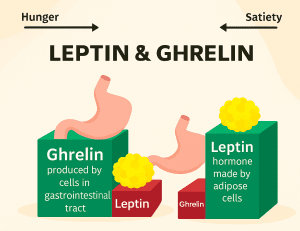Hormones play a crucial role in regulating metabolism, appetite, and fat storage. When these hormones are balanced, maintaining a healthy weight becomes easier. However, imbalances can lead to weight gain, increased cravings, and metabolic issues. Here’s a look at five key hormones that affect weight and how they work.
- Insulin: The Blood Sugar Regulator
Insulin is a hormone produced by the pancreas that helps control blood sugar levels. It moves sugar from the blood into cells, where it’s used for energy. However, excess insulin can lead to fat storage. When the body produces too much insulin, it can cause weight gain and increase the risk of insulin resistance, a condition linked to diabetes and obesity.
- Cortisol: The Stress Hormone
Cortisol is produced by the adrenal glands and is often called the “stress hormone.” It helps the body respond to stress by providing a burst of energy. However, high cortisol levels can also increase hunger and cravings for sweet, fatty, and salty foods. Chronic stress can lead to excessive cortisol production, making it harder to maintain a healthy weight.
- Leptin: The Satiety Hormone
Leptin is responsible for regulating hunger and energy balance. When you eat, fat cells release leptin to signal the brain that you are full. Low leptin levels increase hunger, while a condition called “leptin resistance” can cause the brain to ignore leptin’s signals. This results in continuous hunger, overeating, and weight gain.
- Ghrelin: The Hunger Hormone
Ghrelin is produced in the stomach and signals when it’s time to eat. It rises before meals and decreases after eating. High ghrelin levels can increase hunger, leading to overeating and weight gain. Factors like sleep deprivation, stress, and poor diet choices can elevate ghrelin levels, making it harder to control appetite.

- Thyroid Hormones: The Metabolism Regulators
Thyroid hormones, including T3 and T4, are essential for regulating metabolism, energy production, and body temperature. They influence heart rate, digestion, and how the body processes fats, proteins, and carbohydrates. An imbalance in thyroid hormones can slow or speed up metabolism, leading to weight gain or loss, fatigue, and other health issues.
Final Thoughts
Balancing these hormones is key to maintaining a healthy weight. Managing stress, getting enough sleep, eating a nutritious diet, and staying active can help keep these hormones in check. By understanding how hormones affect weight, you can take steps toward a healthier lifestyle and long-term well-being.



